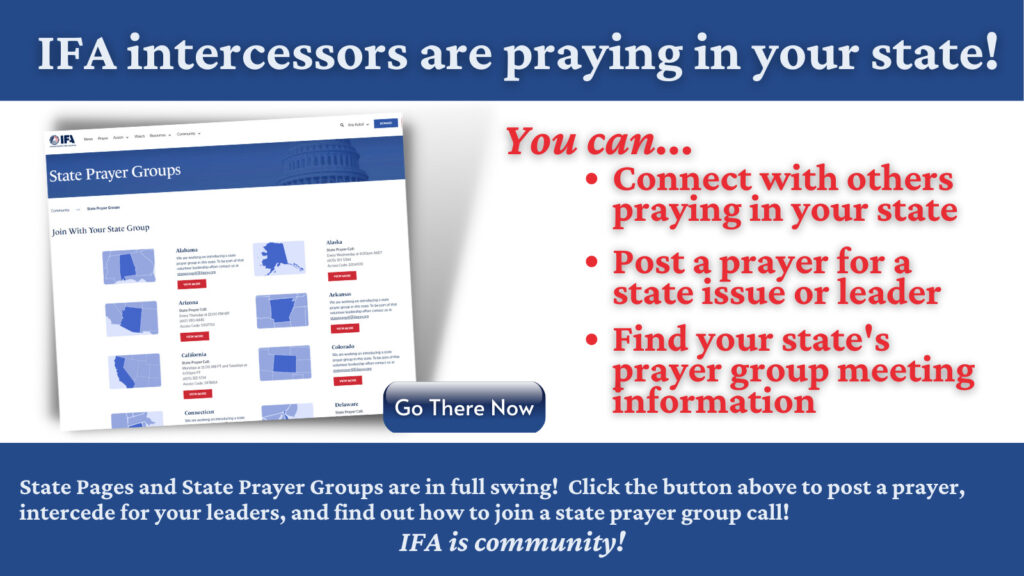
Super Bowl Sunday. Since 2018, when the Supreme Court struck down a federal ban on betting on live games, sports betting has increased tenfold. Online gambling on the Super Bowl is expected to double what it was last year when one in 5 American adults placed a bet — 50 million Americans are expected to place a bet. IFA intercessors have prayed about gambling for 50 years, experiencing great victories in many states. The trend turned. Read and pray about the dangers of the explosive growth of gambling. Please share your prayers in the comments after you read.
It was a cold January day and I flipped on the TV with my boys to see what sports might be on. I’m pretty cautious about what my kids watch, but I found a soccer match that seemed like a fun and safe choice. I’d just have my hand on the remote to flip somewhere else during the commercials (those are always a risk — especially the networks’ promotions of their primetime programming).
Who is praying on the wall?
But then I noticed something. Everywhere I looked on the field were gambling promotions. And it wasn’t signs on the sidelines or even a pop-up ad overlayed on the network’s screen. Every player had a uniform celebrating either Dafabet or Hollywoodbet — two global gambling companies.
Now my boys are young, and I doubt they noticed these brazen ads on the athletes. But what were those placements subtly communicating to them? What about to me? How were those ads trying to soften us — some might say groom us — not just to tolerate gambling, but to celebrate and partake in it? I shouldn’t have been surprised (I’ve written about sports betting before), but still I was shocked by the shameless embrace of gambling by the teams, by the league, and by the network.
I understand why, of course. Gambling is a highly lucrative business. Data released last month by the American Gaming Association (AGA), the national trade group for casinos and their partners, indicates the industry took in nearly $55 billion of revenue between January and November 2022. While much of that money comes from slots, sports gambling accounted for $6.56 billion and is striking in its growth — more than a 65 percent year-over-year increase!
And that’s not all. Tomorrow is the Super Bowl, and the AGA expects more than 50 million Americans — roughly one out of every five U.S. adults — will place bets totaling more than $16 billion on the big game. That’s more than double the group’s estimates last year.
Again, this is big money. You can see the allure for sports leagues and states to grab a piece of the action. Indeed, since the U.S. Supreme Court struck down a law in 2018 that had largely restricted sports betting to Nevada, 36 states scrambled to legalize it with eight more considering efforts to join their ranks. And the major sports leagues are “all in” — hence the inescapable ads.
But it wasn’t always that way. Not long ago the major leagues were vigorously opposed to sports betting. For example, in 2012 then-MLB Commissioner Bud Selig said gambling is “evil, creates doubt, and destroys your sport.”
Did a Supreme Court ruling eviscerate any wisdom behind that statement? I don’t think so. And I don’t think the court thought so either. Justice Samuel Alito, who wrote the decision, essentially made a federalist argument putting the issue back in the hands of Congress. But he also recognized concerns that sports betting could “hook the young on gambling, encourage people of modest means to squander their savings and earnings, and corrupt professional and college sports.”
It’s important to remember that all the revenues now relished by the states, the leagues, and the gaming industry are built on the losses of their constituents. That alone seems likely to erode trust in games and institutions. But even worse is that those losses come from truly risky behavior.
The Mayo Clinic says, “Gambling can stimulate the brain’s reward system much like drugs or alcohol can, leading to addiction.”
It adds, “If you have a problem with compulsive gambling, you may continually chase bets that lead to losses, use up savings and create debt. You may hide your behavior and even turn to theft or fraud to support your addiction.”
This should concern us about gambling generally, but a National Council on Problem Gambling review of recent studies suggests sports bettors are at least twice as likely to have gambling problems — and it’s even worse when the wagering is done online.
One psychiatrist recently wrote that she has seen a shift in her clients struggling with gambling. They tend to be young men in their 20’s who were enticed by gaming promotions during sporting events (she notes specifically FanDuel’s supposedly risk-free “No Sweat First Bet”). They believed they could beat the odds with their elite sports knowledge. But once drawn in her clients found it difficult to escape.
“With most sportsbooks offering betting apps, my clients are finding it more difficult to quit gambling than ever before,” she wrote. “Unlike other forms of gambling, such as playing roulette or slots at a casino, these apps are on their phones and in their pockets, accompanying them wherever they go.”
Sports betting’s allure is dangerous. As you see the inescapable ads tomorrow and beyond, will you pray for government and league leaders to resist the temptation of immediate dollars and be mindful of the risks of sports gambling? It’s truly a bad bet.
Aaron Mercer is a Contributing Writer with two decades of experience in Washington, D.C.’s public policy arena. Photo Credit: Canva.

